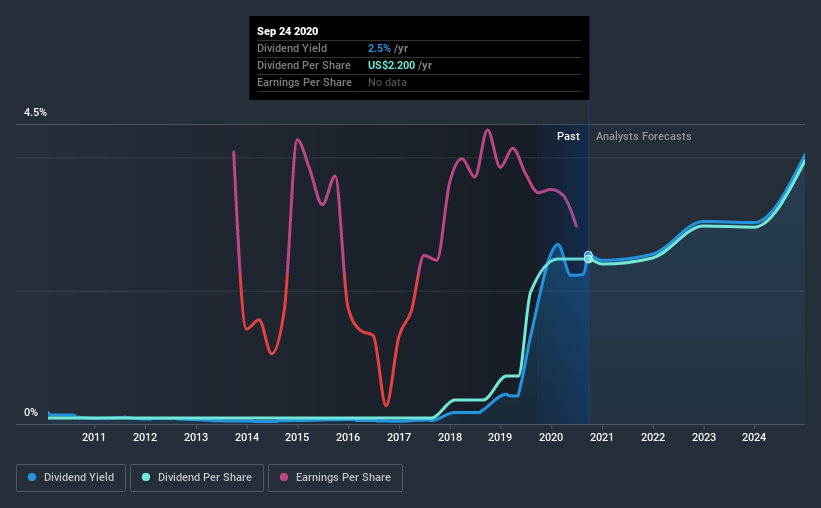Pioneer Natural Resources Company (NYSE:PXD) Goes Ex-Dividend Soon

Some investors rely on dividends for growing their wealth, and if you're one of those dividend sleuths, you might be intrigued to know that Pioneer Natural Resources Company (NYSE:PXD) is about to go ex-dividend in just four days. You will need to purchase shares before the 29th of September to receive the dividend, which will be paid on the 14th of October.
Pioneer Natural Resources's next dividend payment will be US$0.55 per share, on the back of last year when the company paid a total of US$2.20 to shareholders. Looking at the last 12 months of distributions, Pioneer Natural Resources has a trailing yield of approximately 2.5% on its current stock price of $86.9. We love seeing companies pay a dividend, but it's also important to be sure that laying the golden eggs isn't going to kill our golden goose! We need to see whether the dividend is covered by earnings and if it's growing.
View our latest analysis for Pioneer Natural Resources
If a company pays out more in dividends than it earned, then the dividend might become unsustainable - hardly an ideal situation. It paid out 77% of its earnings as dividends last year, which is not unreasonable, but limits reinvestment in the business and leaves the dividend vulnerable to a business downturn. We'd be concerned if earnings began to decline. Yet cash flows are even more important than profits for assessing a dividend, so we need to see if the company generated enough cash to pay its distribution. It paid out more than half (65%) of its free cash flow in the past year, which is within an average range for most companies.
It's encouraging to see that the dividend is covered by both profit and cash flow. This generally suggests the dividend is sustainable, as long as earnings don't drop precipitously.
Click here to see the company's payout ratio, plus analyst estimates of its future dividends.
Have Earnings And Dividends Been Growing?
Companies with falling earnings are riskier for dividend shareholders. If business enters a downturn and the dividend is cut, the company could see its value fall precipitously. With that in mind, we're discomforted by Pioneer Natural Resources's 19% per annum decline in earnings in the past five years. When earnings per share fall, the maximum amount of dividends that can be paid also falls.
The main way most investors will assess a company's dividend prospects is by checking the historical rate of dividend growth. In the past 10 years, Pioneer Natural Resources has increased its dividend at approximately 39% a year on average. The only way to pay higher dividends when earnings are shrinking is either to pay out a larger percentage of profits, spend cash from the balance sheet, or borrow the money. Pioneer Natural Resources is already paying out a high percentage of its income, so without earnings growth, we're doubtful of whether this dividend will grow much in the future.
Final Takeaway
From a dividend perspective, should investors buy or avoid Pioneer Natural Resources? While earnings per share are shrinking, it's encouraging to see that at least Pioneer Natural Resources's dividend appears sustainable, with earnings and cashflow payout ratios that are within reasonable bounds. Bottom line: Pioneer Natural Resources has some unfortunate characteristics that we think could lead to sub-optimal outcomes for dividend investors.
With that being said, if you're still considering Pioneer Natural Resources as an investment, you'll find it beneficial to know what risks this stock is facing. Our analysis shows 3 warning signs for Pioneer Natural Resources and you should be aware of these before buying any shares.
If you're in the market for dividend stocks, we recommend checking our list of top dividend stocks with a greater than 2% yield and an upcoming dividend.
This article by Simply Wall St is general in nature. It does not constitute a recommendation to buy or sell any stock, and does not take account of your objectives, or your financial situation. We aim to bring you long-term focused analysis driven by fundamental data. Note that our analysis may not factor in the latest price-sensitive company announcements or qualitative material. Simply Wall St has no position in any stocks mentioned.
Have feedback on this article? Concerned about the content? Get in touch with us directly. Alternatively, email editorial-team@simplywallst.com.

 Yahoo News
Yahoo News 

